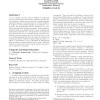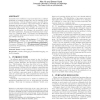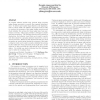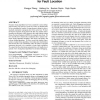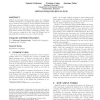130
click to vote
AADEBUG
2005
Springer
15 years 4 months ago
2005
Springer
In a C compiler, function calls are difficult to implement correctly because they must respect a platform-specific calling convention. But they are governed by a simple invariant...
136
click to vote
AADEBUG
2005
Springer
15 years 4 months ago
2005
Springer
Increased reuse of software components has led to a software mishmash as existing packages are used as building blocks for new systems. Current debuggers cannot cope with the intr...
166
click to vote
AADEBUG
2005
Springer
15 years 4 months ago
2005
Springer
We present a way to incorporate backtracking and dynamic patching into existing debuggers, without requiring any change to their source code, the compiler or the run-time environm...
132
click to vote
AADEBUG
2005
Springer
15 years 7 months ago
2005
Springer
A complex software system may perform many program tasks during execution to provide the required functionalities. To detect and localize bugs related to the implementation of the...
141
click to vote
AADEBUG
2005
Springer
15 years 7 months ago
2005
Springer
Debugging techniques have evolved over the years in response to changes in programming languages, implementation techniques, and user needs. A new type of implementation vehicle f...
152
click to vote
AADEBUG
2005
Springer
15 years 7 months ago
2005
Springer
Dynamic slicing algorithms have been considered to aid in debugging for many years. However, as far as we know, no detailed studies on evaluating the benefits of using dynamic sl...
144
click to vote
AADEBUG
2005
Springer
15 years 7 months ago
2005
Springer
This paper introduces program chipping, a simple yet effective technique to isolate bugs. This technique automatically removes or chips away parts of a program so that the part t...
129
click to vote
AADEBUG
2005
Springer
15 years 7 months ago
2005
Springer
AMPLE locates likely failure-causing classes by comparing method call sequences of passing and failing runs. A difference in method call sequences, such as multiple deallocation ...
